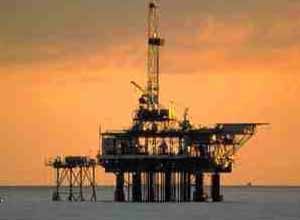July 17, 2007 (the date of publication in Russian)
Sergey Pravosudov
FRANCE'S TOTAL IS WELCOME TO THE ARCTIC SHELF
The French accept what the Americans reject
 A PREFERABLE PARTNER
A PREFERABLE PARTNER
On July 13, Russia's Gazprom and France's Total signed a framework agreement on major conditions of cooperation in development of the first stage of the Shtokmanovskoye gas-condensate area on the shelf of the Barents Sea. Earlier, Gazprom established joint ventures with Germany's BASF and E.ON, Italy's ENI and Enel, and Austria's OMV. Now, it is France's turn to join development of vast reserves of Russian natural gas.
According to the press service of French President Nicolas Sarkozy, Total's involvement in development of the gigantic Shtokmanovskoye was the subject of a personal phone discussion with Vladimir Putin two days before the deal was struck.
It is noteworthy that Total was one of the major sponsors of Nicolas Sarkozy's presidential campaign. Still, the involvement of this company in the project is based not only on considerations of bilateral political relations but also on Total's experience in development of shelf deposits and gas liquefaction.
Besides, partnership with Total will facilitate Gazprom's operations in Iran where the French corporation is involved for years.
JOINT EXTRACTION, RUSSIAN DISTRIBUTION
The agreement between Russian and French gas producers suggests that the two sides establish a special-purpose company for project engineering, financing, construction, and exploitation of the objects of Shtokmanovskoye's first stage. This company will own the infrastructure for 25 years since the facilities are set into operation. Gazprom's stake comprises 75 and Total's 25 per cent. According to Gazprom's CEO Alexei Miller, more foreign companies may be invited – under the condition of Gazprom's ownership of a 51% stake in the developing company, and 100% of the extracted gas.
The first stage of development suggests annual extraction of 23.7 billion cub. m of natural gas, and startup of deliveries of natural gas (since 2013) and later LNG (since 2014). The special-purpose company will take charge for all the financial, geological, and technological risks in extraction of gas and condensed gas and production of LNG. Gazprom is going to pay for the company's services according to a specially calculated formula. Distribution is to be performed by Gazprom independently.
The special-purpose company is guaranteed a target rate of return. Application of a scheme of project financing enables Gazprom to obtain access to technologies, share risks, and minimize accruing liabilities, as finances will be attracted by the developer.
Originally, the whole output of gas of the first stage was supposed to be liquefied and delivered primarily to the US market, while Chevron was going to take part in the development of the deposit. However, the US side was dissatisfied with the provision saying that Gazprom would be the sole owner of the deposit’s resource base. The French side, however, agreed to join in the role of a shareholder of the developing company.
According to the revised scheme of distribution, part of the extracted gas will be directed into the trans-Baltic North Stream pipeline which will deliver part of the gas to France.
Gazprom is still planning to reach American markets, envisaging purchase of stakes in gasification terminals in the United States, as well as in local distributing networks. The US side is now building a number of new gasification terminals. Some of them, however, don't have permanent partners in delivery. Therefore, Gazprom's leadership does not expect the search of free facilities for the company's LNG imports to be a tough problem.
COLD IS RUSSIA'S ALLY
Though the US Congress adopts resolutions denouncing a mythological "gas OPEC" and actually targeting Russian interests, the United States will still have to purchase "blue fuel" from Russia.
In the nearest time, the leading role in LNG production is going to be acquired by Qatar, which possesses the third largest amount of gas reserves after Russia and Iran. However, Murmansk Region, where Gazprom is going to build its major LNG-producing facility, is much closer to the North America's coastline than Doha. It is also noteworthy that natural gas is liquefied by deep freezing, and the cooler is the climate the lower are production costs.
Comparison of relative energy consumption rates in LNG production reveals possibility of annual retrenchment by 3% as compared with Norway, by 8% with Egypt, and by 15% with Oman. That means that with the same designed capacity, it is possible to produce much more LNG in Russia in winter months, and sell it with much higher profit. Thus, the latitude of Russian North provides a tangible advantage in gas trade competition with Gulf states.
Sergey Pravosudov is the Director of National Energy Institute, Moscow
Number of shows: 1106
 ENG
ENG 

 ENG
ENG 
